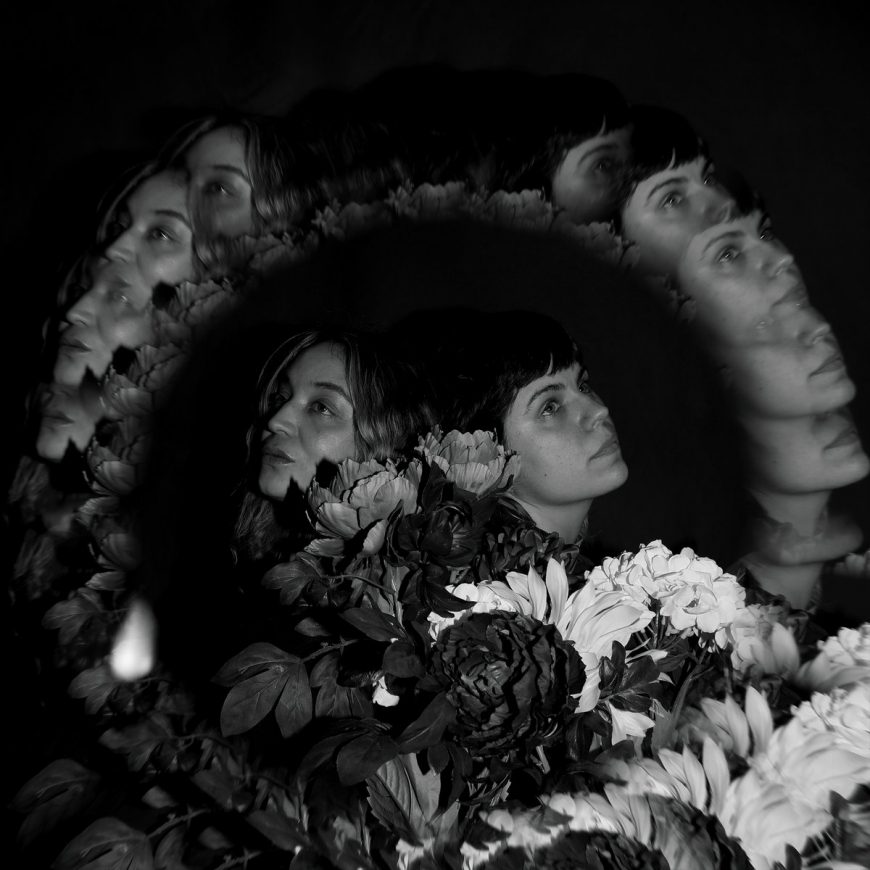
At first blush, the somber squall of Pacific Northwest black metal duo Ragana sounds like the perfect soundtrack for staring off at foggy mountain peaks and daydreaming of death. But on the opening title track of their latest album, Desolation’s Flower, the band makes a case for staying alive as an act of resistance.
“Unending holy bloom that cannot be denied / We hold eternity, they cannot make us die,” co-vocalist Noel Gilson intones in a guttural, glass-busting shriek. “The ones who came before / When hell was all around / Holy are their names who found desolation’s flower.”
“It’s about the resilience of surviving as a trans person or a queer person in the world,” Gilson tells Boulder Weekly on a video call with longtime bandmate Maria Stocke. “I was thinking about the many different marginalized or oppressed groups throughout history — there are so many stories we will never know because they were destroyed or kept away from the historical record. I was feeling a sense of loss for all these people and experiences we will never be able to access or understand.”
“But there’s this lineage of people who have survived, and they’re never actually going to be able to stop us from existing,” they continue. “That feels really hopeful — and powerful, too.”

‘Say it out loud’
Hope goes hand in hand with suffering on Desolation’s Flower, the band’s sixth studio album and first for cult-favorite powerhouse label The Flenser. But just because Stocke and Gilson find glimmers of light in the muck doesn’t mean there’s not plenty of agony to go around on the record’s seven punishing tracks, blending the low-end rumble of sludge rock and the blood-curdling screech of black metal with a beating heart underneath it all.
“We’ve kept that idea of loss and hopelessness with us from the very beginning,” Stocke, 34, says. “When we were writing [our 2012 debut] All’s Lost, we were so young and immature, and I just had no idea what was happening in the world. I was like a literal baby crawling around on the ground as a formless human, trying to understand what anything meant. Now I’m a fully formed adult, and that just makes life so much harder.”
Since the pair first met as early 20-somethings in the beer aisle of a supermarket in their hometown of Olympia, Washington — “in a small town, the grocery store is the club,” Stocke says — their bond has deepened in tandem with a growing understanding of the world’s agonies. Sharpening their antifascist blade against the whetstone of rising sea levels, threats to queer communities and the growing snarl of authoritarianism, Ragana has spent the last decade-plus staring our grimmest realities in the eye.
“The total crushing despair of the fact that the world is being destroyed, and human lives and animals and plants are being destroyed, it really feels most of the time like there’s nothing anyone can do to stop it,” Gilson, 36, says. “A lot of the music I’ve written has been in response to that feeling of hopelessness.”
“You just have to say something about how bad everything is,” they add. “Say it out loud — then other people can feel it with you, and that makes it a little bit better.”
‘Red in tooth and claw’
To anchor themselves against the brutal tide of contemporary American life, Stocke and Gilson find solace in the familiar muse of nature. Roots, valleys and mountains dot the lyrical landscape of Desolation’s Flower — and with Ragana’s two-person dynamic allowing some much-needed air in the room, listeners can dwell on these images and turn them over in the light.
“It feels like a natural way of making metaphor and expressing meaning,” Gilson says. “Part of living in Olympia is being surrounded by the forest and water and mist and rain and clouds and fog. They really give me this sense of inspiration and connection. Land is very powerful — it really draws people here, and I feel like it has something to express.”
“The woods are beautiful, but they’re horrifying,” Stocke adds. “You could get lost in them. Everything is much bigger than you, much more alive. A lot of the music is about how powerful nature is, and how we feel not separate from it, but sort of in awe of it, and sometimes scared.”
As the band share these thoughts during a Jan. 9 video call with Boulder Weekly, the L.A. wildfires are engulfing the city for the second day straight — a somber reminder of nature’s awesome power amid a worsening climate crisis. Gilson, whose earliest memories growing up in Southern California revolve around drought, says the looming threat was formative to their life path.
“That’s one of the things that drew me to the Northwest, because in my mind it was a place that was always going to be damp, where there was always going to be rain,” they say. “Now that’s not true, as we’ve seen. There are wildfires basically everywhere.”
But in true Ragana fashion, this bleak reality offers a seed of hope for these longtime friends and bandmates. As the last line of Desolation’s Flower suggests: “We live in the light of the burning world.” What it looks like on the other side of the blaze, they argue, is up to us.
“These things are going to keep happening,” Gilson says. “There’s really so little that’s in any of our control, but we still have to keep going somehow and figure out how to take care of each other.”
ON THE BILL: Mount Eerie with Ragana. 8 p.m. Saturday, Feb. 22, Fox Theatre, 1135 13th St., Boulder. $38
